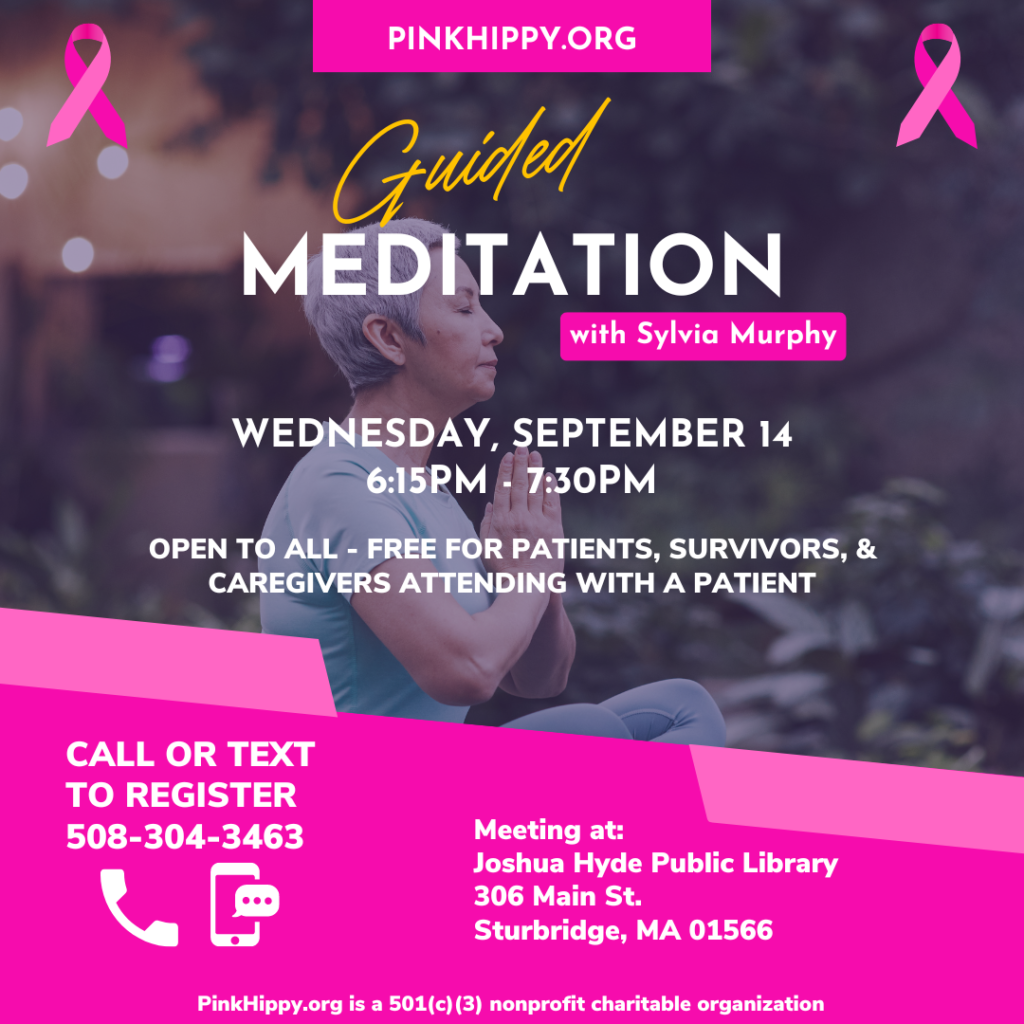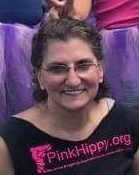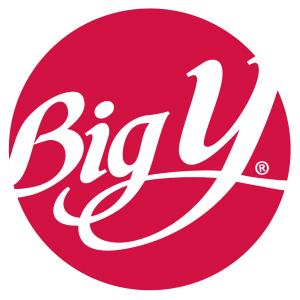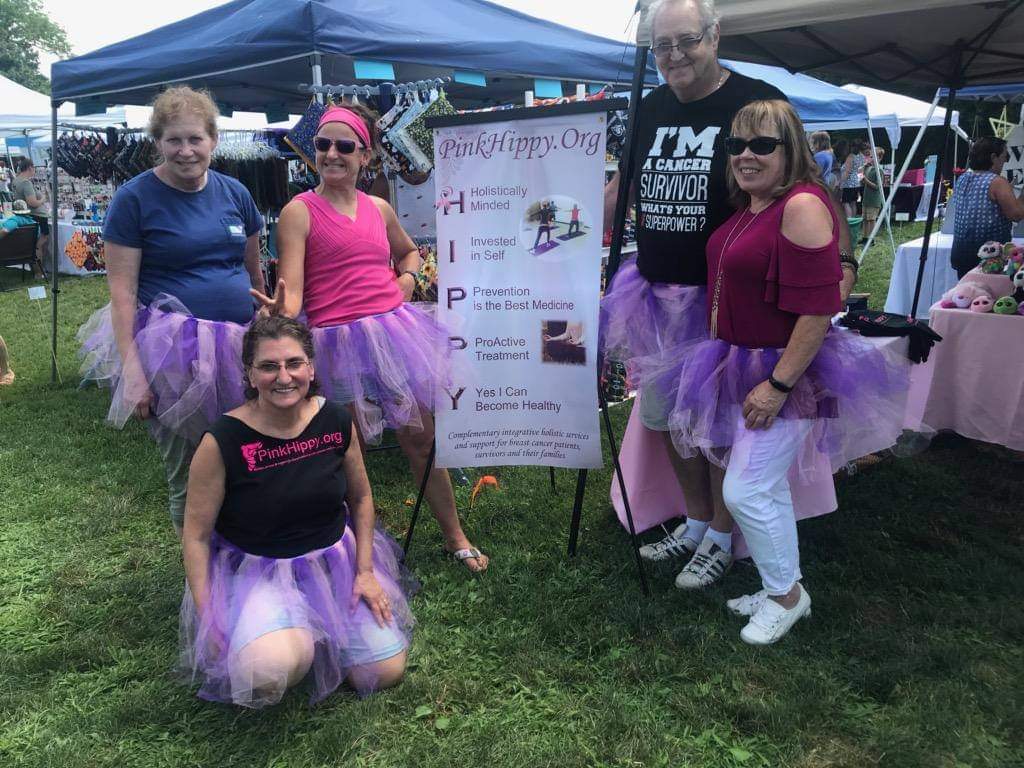When PinkHippy does public events, like the appearance in the photo above, they wear signature pink and purple tutus. As co-founder and board president Del Bachand says, “Everything is done with a warm heart and humor.” Big Y supports this innovative nonprofit organization through its Community Bag Program.
Tell us about PinkHippy.
Our mission is to provide integrative therapies, connections, services and comfort items to cancer patients in our local communities. We serve the communities of south-central Massachusetts, northeastern Connecticut and northwestern Rhode Island. We modeled ourselves after the Zakim Center in Boston that provides wonderful services, but they’re not easily accessible to patients in this area. I know as a survivor myself and currently a caregiver for my husband, who’s battling cancer, that travel is not always a comfortable option. So, if they can get something close to home, so much the better.
We were founded in the fall of 2013 and officially organized as a 501(c)(3) nonprofit in February of 2014. We started literally with a dream, and it came from the shared frustration of not being able to get services in this area. Five women, including myself, got together to form the nonprofit. Each of us was touched in some way by cancer. Two other wonderful women who supported that dream donated the funds needed to get the paperwork started and then with some contacts, we reached out to different people that we knew who provided services. One of them was an oncology massage therapist who inspired us through her own work to provide free oncology massage to patients.
So, with some gumption and some guidance, we kicked off PinkHippy with a series of free lectures that introduced all the different therapies we were planning to provide. Our first grant came from Webster Five to start our oncology yoga program, which was our first offering back in 2014, and we’ve just grown from there.
What sets you apart from other nonprofits in the community?
As far as we know, we are the only program in the area that provides one-on-one patient-to-survivor support. It’s called the Bosom Buddy Network, and we match a survivor as closely with a patient as possible. Depending on what’s going on with the current patient, we find a survivor that went through similar circumstances and create a support partnership. There are a lot of message boards out there and chat rooms and Facebook pages, but most people don’t want to do that. They want to actually hear a human voice or meet a person.
Once a year in October, we do a huge event, and we bring current patients together with survivors. And I think the nicest thing I saw was two complete strangers–one, a survivor and one, a cancer patient–with very different backgrounds, very different ages and cultures who sat across from each other during the event, and they left hugging and exchanging phone numbers. It just cemented why we do Bosom Buddy the way we do.
Another thing that sets us apart is that all of our programs are offered at no cost. We charge nothing to patients. A lot of our programs are also open to survivors and families who are caregivers of the patients, also at no cost.
As far as we know, we are the only program in the area that provides one-on-one patient-to-survivor support.
What services do you provide to the community?
We have a special yoga class that we offer cancer patients that takes into account things like having a port inserted, which is really important. Again, from frustration, we developed our own training program for yoga instructors to teach the class because the programs out there were not equipped to do so.
We changed the names of the yoga poses. Patients are spoken to by the medical community in terms that most of them can’t wrap their heads around. So, we didn’t want them to have one more term thrown at them that they didn’t understand and had to look up. So, we made up names for everything with the help of the patients and they’re all fun names. It’s a very relaxing yoga practice and it works on their breathing and their movement and their range of motion. Many of them have never tried yoga before, and they spend a lot of time sitting or lying down. This gets the whole body moving.
And we offer meditation, art therapy and music therapy. We have oncology massage, reflexology, lymphatic drainage and Reiki. Those are all free as well as a host of comfort items. We have comfort pillows that are made by all volunteers who get together and sew, and they’re really soft, squishy and machine washable. And they do everything from cradling a port to helping wear a seatbelt after surgery, something so simple most people don’t think about unless you’ve had surgery on the top part of your body.
We also provide Knitted Knockers as part of an international organization that we were introduced to. We have volunteers who knit and crochet the knockers and we deliver them all over, as well as hats and blankets.
If you go on our website, there are resources for healthy tips and tricks for when you’re going through cancer treatment; there are healthy recipes, and we have articles on all kinds of things. Everything is in short little bites, an easy format for people.

Tell us a story that illustrates the good work you are doing.
We work with all cancer patients. Although we started off just working with breast cancer patients, we found pretty quickly that we couldn’t turn anybody away. A couple of years ago, not even realizing that this was an issue, we had a call from one of the survivors we had worked with who had a friend who was a man with breast cancer. And he had reached out to some organizations and was told they didn’t work with men, only women. And she asked if we worked with men. I said, “Of course we do. Why wouldn’t we?” And I just was in complete disbelief that men with breast cancer would be turned away. We told her to please have him get in touch with us.
He was phenomenal. He inspired us to now be on a mission to make people aware that men also get breast cancer and what to look for. Though we do it throughout the year, we really make a push in October because that is when people are paying attention.
Richard was a wonderful man. Unfortunately, breast cancer took Richard way too young. He was so kind and so gracious while he was suffering. But he left a mark on all of us.
What is your greatest achievement or contribution to the community?
I asked this of every one of our board members and everybody answered the same way. We couldn’t pick out just one thing. We are proud of the entire program and that we are able to offer it at no cost. Cancer is expensive to have, and we are proud that our program is not another expense for a cancer patient.
Cancer is expensive to have, and we are proud that our program is not another expense for a cancer patient.
What do you want people to know about PinkHippy?
We want them to know to reach out to us; we don’t turn any cancer patient away. We work with all stages of cancer, all types of cancer, as well as survivors and their families and caregivers. We actually have a support group just for the caregivers and families. No patients are allowed. We meet on a monthly basis, but we’re always available to talk to somebody one on one.
How are you using the funds you’ve received from the Big Y Community Bag Program?
Our board of directors takes no compensation; we have donated office space; we work with tons of volunteers. One hundred percent of the funds that we receive from the Big Y Community Bag Program or that we get from grants covers the cost of our services to cancer patients.
For example, our oncology massage therapists have agreed to a lower fee than what they charge in private practice. And we pay them. The same for our yoga instructors. Sometimes we have to pay for the facilities where the yoga is held. Sometimes the facility donates the space but 100% of what we raise goes to services for our cancer patients.

Published August 3, 2022

